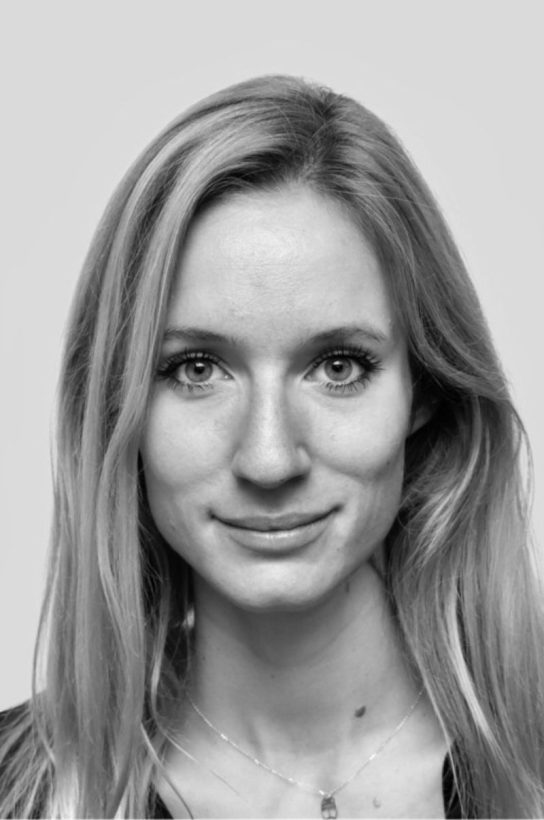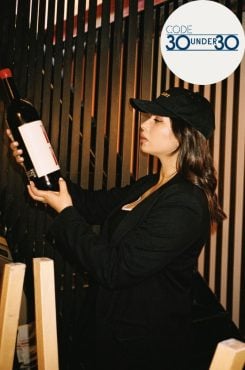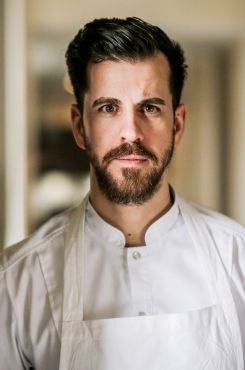CODE meets sunday GM Elisabeth Osmont d’Amilly
Published 31 August 2022
sponsored content in collaboration with sunday

After joining Deliveroo in its infancy and going on to help it become the tech giant it now is, Elisabeth took a role at sunday, a company working to pioneer innovative payment solutions for restaurants. CODE talked to Elisabeth about her passion for hospitality, being (very) French, and what’s next for sunday.
What drew you to hospitality and why are you passionate about it?
I’m French, so I’m a desperate foodie by nature. And I grew up in Paris, which probably makes it even worse, and then you combine that with origins from the south of France, which is really the capital of deliciousness when it comes to food…
I wanted to have a restaurant when I was 16. But no one was an entrepreneur in my family – there was no emphasis around doing your own thing. So, I decided to go to business school and then I moved to London. I arrived on the day of Brexit, which was absolutely not planned. I was going to work at a bank. Obviously, it was not as good for a young intern to start when there was a major change happening in the economy. I started in this kind of madness.
I quickly realised that I didn’t want to do banking. I’m going to be very vanilla here, but I like the idea of doing something that I like when I wake up in the morning. This grew in me particularly when I was doing long hours on something I was not interested in. I figured that I don’t mind the long hours if I’m actually passionate. I thought, ‘Okay, I’m 25, I’m not going to launch my own restaurant, on my own, in London.’ My English was good, but not excellent. I had no money. So, I thought, ‘I’m going to do the second-best thing.’ And the second-best thing for me was to work for restaurants.
And how did you end up at sunday?
I joined Deliveroo at a relatively early stage, at a time when it was very small, almost family-like. I met amazing people and travelled a lot. It was still very, very startup-y. I did different roles and I was fortunate enough to always be on the restaurants team. It was my first real introduction to the restaurant world. But at some point, it just felt like a tech company. And I really liked it. But equally, I was dreaming of a job where I would be more involved in the hospitality part of things. And I was lucky enough to be contacted by sunday.
Sunday is a spinoff of a restaurant group, Big Mamma, so it was very much full-on hospitality. They are from restaurants, for restaurants, and I loved the story. I love the idea that you could change something as simple or as weird, in a way, as payments in a restaurant. Because no one really goes to a restaurant to pay, right? This the idea that you’re going to change payments through QR codes, when they first pitched it to me, I thought: ‘Are you sure?’
As a tech company, how does sunday fit into hospitality?
For me, initially it was just fintech. It was a tech company. But I quickly realised the benefits that it has for restaurants – when you replace these 15 awkward moments when you’re waiting for the bill, with your hand up in the air. You’re waiting tables faster, which means that – especially if you’re high traffic – you’re going to be able to serve more customers, and that increases your top line. When you’re short on staff, you’re very happy that the staff doesn’t have to run after payment terminals. That’s also very much a benefit for the staff.
We have a team that comes from hospitality. And we work very closely with the restaurants to explain how we can fit into the customer journey, as opposed to just saying: ‘Here’s a QR code, off you go. This is tech, embrace it.’ We don’t do that. That’s why I think we are hospitality, not just tech. And it ends up with the staff entailing a lot more tips than they used to. We allow restaurants tools to get more in touch with the customer. We’ve launched a system where you can review and rate the restaurant internally for bouncing back and improvements. And I think it’s extremely exciting, what you can do with payments – when you don’t make it just for payments.
What does your job look like?
My job is to launch the UK market. There is a lot of leadership, essentially defining the strategy for the markets. For instance, how do we approach the hospitality industry – it’s a £60 billion industry, I believe. It’s absolutely massive. You cannot just go after restaurants without any strategy. You have to understand where you’re going, what type of restaurant you can bring the most value to with the current product. And then in the future, with more developments, what kind of markets you can address.
Do you have any career advice for young women starting off in hospitality?
I don’t think it’s only related to hospitality. I am a mentor to a few people from business school who are young graduates, and I always say the same thing: it’s really important that you build your self-confidence, because there will always be imposter syndrome. I mean, I have it on a daily basis. And I think it’s great, because the second I don’t have it, I’m probably not learning enough. It’s a good thing to embrace it.
Number one: embrace for impostor syndrome. And number two: choose to work for people that you actually admire, and that are going to elevate you, as opposed to making you doubt your own abilities. Find people who challenge you in the right way and respect you because, ultimately, there’s only a given amount of hours in the day, and you should not be miserable at work. I’ve seen too much of these contexts, especially in banking, where there are very toxic workplaces. I saw my friends very miserable, and I don’t think that’s OK.
What’s next for sunday?
We’re launching a new part of our business model, which is going to be based on SAS – ‘software as a service’. Essentially, you subscribe to extra services that are going to bring you much more than payment.
We know that right now restaurants have a lot of questions around how they can differentiate themselves versus another restaurant. For instance, how do they keep their relationship with their customers, especially when they haven’t been booked through a platform like SevenRooms? They don’t have any information, especially if you pay in cash or at a payment terminal. They will never be able to reach out to you and say, ‘Hey, how was your meal? Next time you come, we would love to offer you a free ramen because you’ve been here seven times now. We’d love to reward you.’
Kanada Ya is a very strong example, because they, we’ve always had a strong relationship with them. They went from 200 tips a month per site to 1,000. I think that’s really cool, because we’re co-building this with the restaurants. And I think that’s where having this restaurateurs’ heart that is coming from our founder is pretty cool. We’re thinking as restaurants as opposed to just as tech.




